The Impact Testing Machine Market is estimated to be valued at USD 423.0 million in 2025 and is projected to reach USD 750.4 million by 2035, registering a compound annual growth rate (CAGR) of 5.9% over the forecast period.
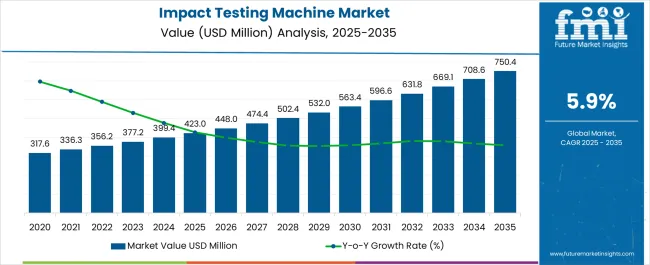
| Metric | Value |
|---|---|
| Impact Testing Machine Market Estimated Value in (2025 E) | USD 423.0 million |
| Impact Testing Machine Market Forecast Value in (2035 F) | USD 750.4 million |
| Forecast CAGR (2025 to 2035) | 5.9% |
The Impact Testing Machine market is experiencing steady growth driven by increasing demand for precise material evaluation in automotive, aerospace, construction, and industrial manufacturing sectors. The market is currently being shaped by the need for quality assurance and regulatory compliance in product safety, particularly in industries where mechanical strength and durability are critical. Technological advancements in testing machines, including enhanced accuracy, digital interfaces, and automated reporting capabilities, are enabling faster and more reliable testing.
The shift towards integrating software-based data analysis and real-time monitoring has further strengthened market adoption. Rising industrialization and expanding automotive production are creating consistent demand for high-performance impact testing solutions.
Investments in research and development to improve testing methodologies, coupled with increased awareness about material safety and performance standards, are paving the way for future market growth As manufacturers continue to prioritize durability, safety, and material innovation, the demand for impact testing machines is expected to remain robust across key industrial segments.
The impact testing machine market is segmented by machine type, material type, end use industry, and geographic regions. By machine type, impact testing machine market is divided into Pendulum Impact Tester and Drop Weight Impact Tester. In terms of material type, impact testing machine market is classified into Metal, Plastic, and Composite & Non-Metallic. Based on end use industry, impact testing machine market is segmented into Automotive, Aerospace & Defense, General Manufacturing, Construction, Plastic, and Institutional. Regionally, the impact testing machine industry is classified into North America, Latin America, Western Europe, Eastern Europe, Balkan & Baltic Countries, Russia & Belarus, Central Asia, East Asia, South Asia & Pacific, and the Middle East & Africa.
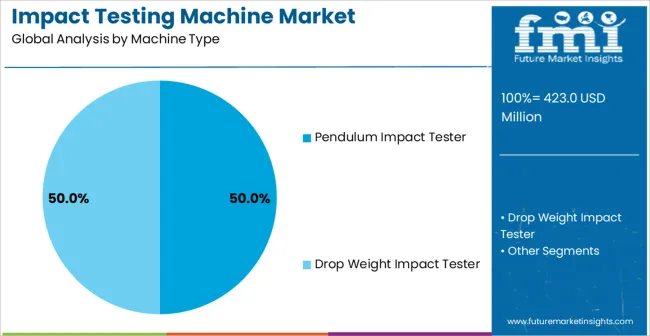
The Pendulum Impact Tester segment is projected to hold 50.0% of the Impact Testing Machine market revenue in 2025, making it the leading machine type. This dominance is being driven by its widespread adoption for evaluating the toughness and fracture resistance of materials under dynamic loading. Pendulum testers are highly valued for their accuracy, reliability, and ease of operation in laboratory and industrial environments.
The growth of this segment has been further supported by regulatory standards that require rigorous impact testing, particularly in the automotive and aerospace sectors. The ability to generate repeatable results with minimal sample preparation has made pendulum impact testers a preferred choice for both research laboratories and manufacturing quality control.
Future adoption is expected to accelerate as industries increasingly seek efficient testing systems capable of integrating with digital data analysis and quality management frameworks The segment’s continued expansion is being enabled by a balance of cost-effectiveness, operational simplicity, and compliance with standardized testing procedures.
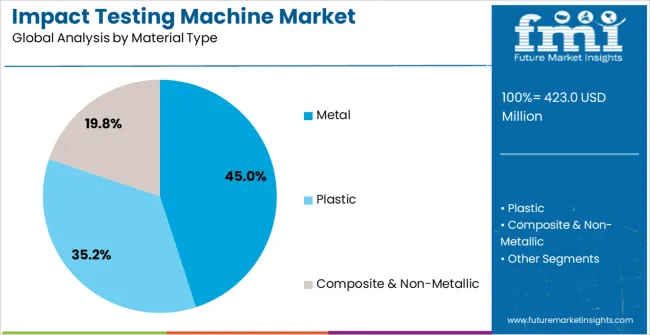
The Metal material type segment is anticipated to hold 45.0% of the Impact Testing Machine market revenue in 2025, representing the largest share by material. This leadership position is being influenced by the critical need to assess mechanical strength, toughness, and durability of metals used in structural, automotive, and industrial applications. Metals are widely subjected to impact and stress in operational environments, which makes precise evaluation essential for safety and performance.
Growth in this segment has been further reinforced by rising investments in automotive manufacturing and infrastructure development, where metals remain the primary material. The increasing adoption of high-strength alloys and engineered metals has also driven the demand for advanced testing to ensure compliance with industry standards.
Metal testing has become integral to product design, certification, and quality assurance processes The segment is expected to maintain strong growth as material innovations continue to require rigorous impact analysis and verification, ensuring reliability and performance across multiple industries.
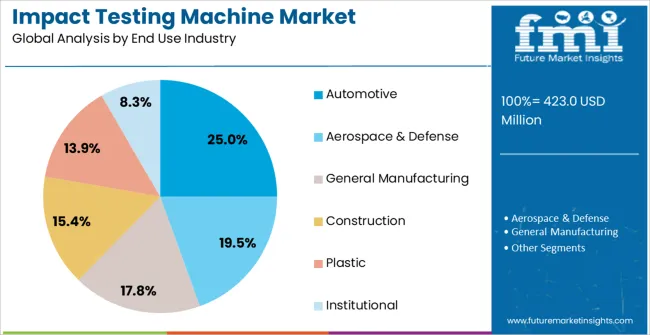
The Automotive end-use industry segment is projected to capture 25.0% of the Impact Testing Machine market revenue in 2025, establishing it as the leading end-use sector. This prominence is being driven by the automotive industry’s focus on vehicle safety, material performance, and regulatory compliance for impact and crashworthiness testing. The segment benefits from the widespread use of metals and composite materials in vehicle manufacturing, which require precise evaluation to ensure occupant protection and structural integrity.
Growth has been further supported by rising automotive production in both established and emerging markets, where durability and safety are top priorities. Automotive manufacturers are increasingly investing in testing laboratories equipped with advanced impact testing machines to streamline research and development, reduce recalls, and optimize component design.
The adoption of digital interfaces and real-time data acquisition in testing machines has enabled faster decision-making and enhanced quality control The commercial emphasis on sustainable, high-performance vehicles is anticipated to drive continued demand for impact testing solutions within the automotive sector, solidifying its market leadership.
Impact testing machine is used for evaluating the objects capacity to withstand high rate of loading and is used to determine the service life of the material. Impact testing machine is one of the type of testing equipment used for measure mechanical properties of a material and is useful in assessing the material’s liability and safety.
There are basically two types of impact testing machine i.e. pendulum impact tester and drop weight impact tester. Impact testing machine is utilized to evaluate the impact strength of wide range of materials such as metals, plastic, ceramics, concrete, cement, etc.
In general, impact testing machine measures the response of a material to dynamic loading and determining its toughness. Over the past decade, the manufacturers are releasing the importance of impact testing. Some of the industries utilizing impact testing machine includes automotive, aerospace & defense, construction, plastic, general manufacturing and other.
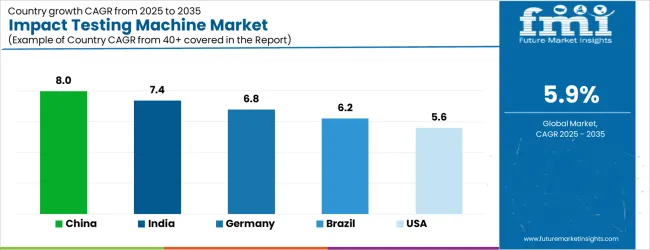
| Country | CAGR |
|---|---|
| China | 8.0% |
| India | 7.4% |
| Germany | 6.8% |
| Brazil | 6.2% |
| USA | 5.6% |
| UK | 5.0% |
| Japan | 4.4% |
The Impact Testing Machine Market is expected to register a CAGR of 5.9% during the forecast period, exhibiting varied country level momentum. China leads with the highest CAGR of 8.0%, followed by India at 7.4%. Developed markets such as Germany, France, and the UK continue to expand steadily, while the USA is likely to grow at consistent rates. Japan posts the lowest CAGR at 4.4%, yet still underscores a broadly positive trajectory for the global Impact Testing Machine Market. In 2024, Germany held a dominant revenue in the Western Europe market and is expected to grow with a CAGR of 6.8%. The USA Impact Testing Machine Market is estimated to be valued at USD 151.6 million in 2025 and is anticipated to reach a valuation of USD 151.6 million by 2035. Sales are projected to rise at a CAGR of 0.0% over the forecast period between 2025 and 2035. While Japan and South Korea markets are estimated to be valued at USD 21.7 million and USD 12.7 million respectively in 2025.
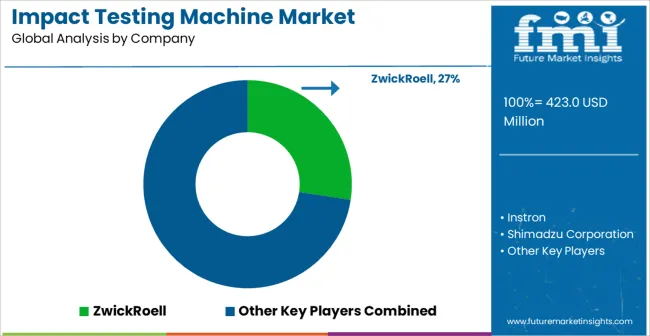
| Item | Value |
|---|---|
| Quantitative Units | USD 423.0 Million |
| Machine Type | Pendulum Impact Tester and Drop Weight Impact Tester |
| Material Type | Metal, Plastic, and Composite & Non-Metallic |
| End Use Industry | Automotive, Aerospace & Defense, General Manufacturing, Construction, Plastic, and Institutional |
| Regions Covered | North America, Europe, Asia-Pacific, Latin America, Middle East & Africa |
| Country Covered | United States, Canada, Germany, France, United Kingdom, China, Japan, India, Brazil, South Africa |
| Key Companies Profiled | ZwickRoell, Instron, Shimadzu Corporation, ADMET, Inc., Tinius Olsen, Hegewald & Peschke, and Labthink Instruments |
The global impact testing machine market is estimated to be valued at USD 423.0 million in 2025.
The market size for the impact testing machine market is projected to reach USD 750.4 million by 2035.
The impact testing machine market is expected to grow at a 5.9% CAGR between 2025 and 2035.
The key product types in impact testing machine market are pendulum impact tester and drop weight impact tester.
In terms of material type, metal segment to command 45.0% share in the impact testing machine market in 2025.






Our Research Products

The "Full Research Suite" delivers actionable market intel, deep dives on markets or technologies, so clients act faster, cut risk, and unlock growth.

The Leaderboard benchmarks and ranks top vendors, classifying them as Established Leaders, Leading Challengers, or Disruptors & Challengers.

Locates where complements amplify value and substitutes erode it, forecasting net impact by horizon

We deliver granular, decision-grade intel: market sizing, 5-year forecasts, pricing, adoption, usage, revenue, and operational KPIs—plus competitor tracking, regulation, and value chains—across 60 countries broadly.

Spot the shifts before they hit your P&L. We track inflection points, adoption curves, pricing moves, and ecosystem plays to show where demand is heading, why it is changing, and what to do next across high-growth markets and disruptive tech

Real-time reads of user behavior. We track shifting priorities, perceptions of today’s and next-gen services, and provider experience, then pace how fast tech moves from trial to adoption, blending buyer, consumer, and channel inputs with social signals (#WhySwitch, #UX).

Partner with our analyst team to build a custom report designed around your business priorities. From analysing market trends to assessing competitors or crafting bespoke datasets, we tailor insights to your needs.
Supplier Intelligence
Discovery & Profiling
Capacity & Footprint
Performance & Risk
Compliance & Governance
Commercial Readiness
Who Supplies Whom
Scorecards & Shortlists
Playbooks & Docs
Category Intelligence
Definition & Scope
Demand & Use Cases
Cost Drivers
Market Structure
Supply Chain Map
Trade & Policy
Operating Norms
Deliverables
Buyer Intelligence
Account Basics
Spend & Scope
Procurement Model
Vendor Requirements
Terms & Policies
Entry Strategy
Pain Points & Triggers
Outputs
Pricing Analysis
Benchmarks
Trends
Should-Cost
Indexation
Landed Cost
Commercial Terms
Deliverables
Brand Analysis
Positioning & Value Prop
Share & Presence
Customer Evidence
Go-to-Market
Digital & Reputation
Compliance & Trust
KPIs & Gaps
Outputs
Full Research Suite comprises of:
Market outlook & trends analysis
Interviews & case studies
Strategic recommendations
Vendor profiles & capabilities analysis
5-year forecasts
8 regions and 60+ country-level data splits
Market segment data splits
12 months of continuous data updates
DELIVERED AS:
PDF EXCEL ONLINE
Automatic Impact Testing Machine Market Size and Share Forecast Outlook 2025 to 2035
Tire Testing Machine Market Size and Share Forecast Outlook 2025 to 2035
Bend Testing Machine Market Growth - Trends & Forecast 2025 to 2035
An Analysis of the Leak testing Machine Market by Detectors and Sensors Hardware Type through 2035
Market Share Distribution Among Leak Testing Machine Providers
Leak testing Machine Market
Pack Testing Machines Market
Leather Testing Machine Market Size and Share Forecast Outlook 2025 to 2035
Fatigue Testing Machine Market Size and Share Forecast Outlook 2025 to 2035
Tensile Testing Machine Market Size and Share Forecast Outlook 2025 to 2035
Hardness Testing Machine Market Size and Share Forecast Outlook 2025 to 2035
Resonant Testing Machine Market
Lubricant Testing Machine Market Size and Share Forecast Outlook 2025 to 2035
Universal Testing Machine Market Growth – Trends & Forecast 2025-2035
Compression Testing Machines Market Size and Share Forecast Outlook 2025 to 2035
Permeability Testing Machine Market Size and Share Forecast Outlook 2025 to 2035
Machine Glazed Paper Market Size and Share Forecast Outlook 2025 to 2035
Impact Resistant Glass Market Forecast Outlook 2025 to 2035
Machine Glazed Kraft Paper Market Forecast and Outlook 2025 to 2035
Machine Condition Monitoring Market Size and Share Forecast Outlook 2025 to 2035

Thank you!
You will receive an email from our Business Development Manager. Please be sure to check your SPAM/JUNK folder too.
Chat With
MaRIA